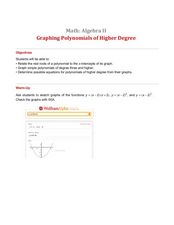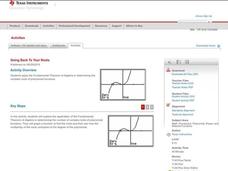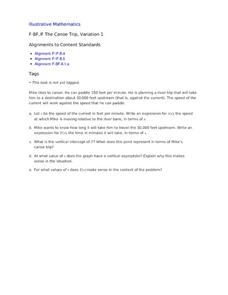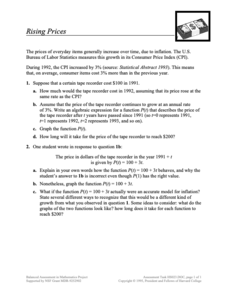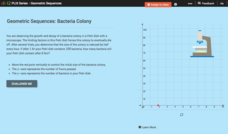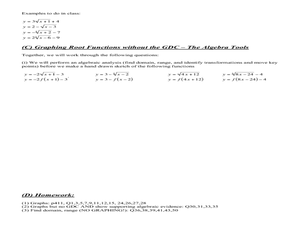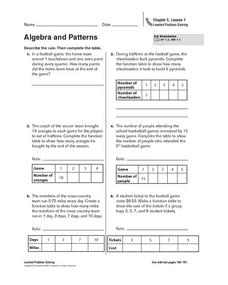Curated OER
Birthday Problem
Young scholars identify the probability of an event occurring. Learners explore the complement of an event in finding why an event will not happen. They also explore basics of probability within algebra.
Curated OER
Investigating Transformations Of Parent Functions
Students identify the basic transformations of parent functions. They use their graphing calculator to create a transformation booklet by folding a sheet of computer paper in half and stapling along the folded edge.
Curated OER
Transformations and Translation of Functions
Students translate functions horizontally and vertically. In this algebra lesson plan, students identify the parts of the formula that allows the graph to move left, right, up and down. They perform a transformation on the coordinate plane.
Curated OER
Transformations: Dilating Functions
Students dilate functions using transformation. In this algebra lesson, students complete vertical dilation, stretch and shrink. They perform reflection across the x and y axis.
Curated OER
Evaluating Variable Expressions
In this variable expressions activity, students evaluate expressions for given terms. Each of the ten expressions contain three variables. Students substitute a given value for the variable and solve the equation.
Curated OER
Eight Multiple Choice Domain and Range of Functions Problems
In this function learning exercise, students determine domains and ranges in eight multiple choice problems. The solutions are provided.
Kenan Fellows
Half-Life
Scholars shake their way to understanding half-life with the help of candy. They observe and record which side candy lands on to graph the exponential decay in the fifth lesson of seven integrating chemistry and algebra. Combining...
Curated OER
Profitable Soda Stand
Am I making any money? Help learners determine if their fictitious soda stand is turning a profit. They graph linear equations using the slope and y-intercept and identify the best price to use to sell soda. They identify the domain and...
Curated OER
Graphing Exponentials
Bring your Algebra class to the computer lab! Using materials created by Texas Instruments, they explore exponentiasl and graphs. Be sure to download the correct materials (on the right side of the webpage) before having them walk...
EngageNY
Linear Systems in Three Variables
Put all that algebra learning to use! Using algebraic strategies, learners solve three-variable systems. They then use the three-variable systems to write a quadratic equation given three points on the parabola.
Curated OER
Domains
Your algebra learners work to address the order of operations applied to an expression's input variable and the limitations that may be created because of it. This simple task of a few very well-chosen exercises is elegant in it's way of...
Curated OER
Graphing Polynomials of Higher Degree
Using Wolframalpha graphing capabilites, algebra learners graph polynomials with degrees of three and larger. They identify the roots and graph each polynomial, predict zeros and shapes of graphs, and validate their understanding through...
Curated OER
Going Back to Your Roots
Who doesn't need to know the Fundamental Theorem of Algebra? Use the theorem to find the roots of a polynomial on a TI calculator. The class explores polynomials with one solution, no real solutions, and two solutions. This less lesson...
West Contra Costa Unified School District
Polynomial Division
How do you apply the traditional division algorithm to polynomials? Here is an Algebra II lesson that extends the use of the division algorithm to polynomials. After establishing the concept of long division, synthetic division and the...
Curated OER
The Canoe Trip, Variation 1
Your river sportsmen will explore an example of paddling upstream as they build functions modeling speed and time in terms of the speed of the current. They then use their algebraic models to interpret features of the function related to...
Concord Consortium
Rising Prices
What will that cost in the future? The scenario provides pupils with a growth as a Consumer Price Index. Learners create functions for a given item to determine future prices and graph them. Class members then compare their functions to...
EngageNY
Recursive Formulas for Sequences
Provide Algebra I learners with a logical approach to making connections between the types of sequences and formulas with a instructional activity that uses what class members know about explicit formulas to develop an...
West Contra Costa Unified School District
Factoring Quadratic Expressions
Factor in different strategies in a lesson for factoring quadratics. Young mathematicians first create tables and area models to factor quadratic trinomials into two binomials by guess and check. Learners then investigate how they can...
Curated OER
The Customers
Exploring functions not represented by an expression is this task's secret. As your learners organize business customers in a database, they explore the definition of what it is to be a function.
Curated OER
Bacteria Populations
Your young microbiologists will interpret and solve exponential equations in this real-world context task set in a hospital research scenario. Learners think in terms of the functions as well as their rates of change.
CK-12 Foundation
Geometric Sequences: Bacteria Colony
Show budding mathematicians how to model a diminishing bacteria colony two ways—graphically and algebraically. Using the coordinate axis, pupils create a graph to represent the decay of a bacteria colony. They determine the number of...
Curated OER
Graphing Radical Functions-A Graphic Introduction
In this Algebra II worksheet, 11th graders graph root functions and analyze the domain, range, intercepts, maximum and minimum values, and end behavior. students use that information to transform the graphs of root...
Curated OER
Algebra and Patterns
In this algebra and patterns practice worksheet, students sharpen their problem solving skills as they solve 6 story problems.
Curated OER
Functions
In this Algebra I/Algebra II instructional activity, students evaluate functions. Students graphs functions and determine the domain and range, find the sum, difference, and product of functions, find composite functions and explore...













